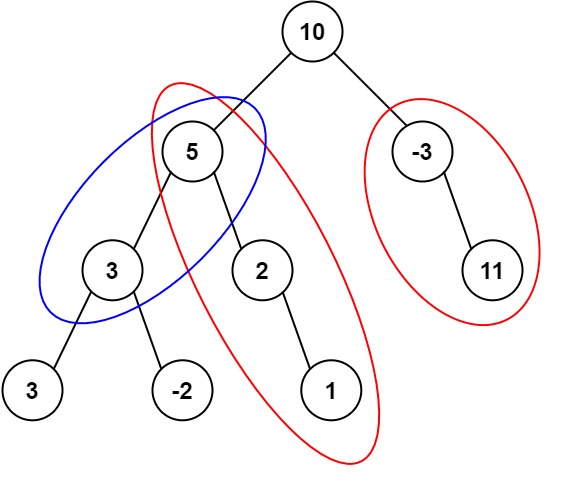LeetCode-in-All
437. Path Sum III
Medium
Given the root of a binary tree and an integer targetSum, return the number of paths where the sum of the values along the path equals targetSum.
The path does not need to start or end at the root or a leaf, but it must go downwards (i.e., traveling only from parent nodes to child nodes).
Example 1:

Input: root = [10,5,-3,3,2,null,11,3,-2,null,1], targetSum = 8
Output: 3
Explanation: The paths that sum to 8 are shown.
Example 2:
Input: root = [5,4,8,11,null,13,4,7,2,null,null,5,1], targetSum = 22
Output: 3
Constraints:
- The number of nodes in the tree is in the range
[0, 1000]. -109 <= Node.val <= 109-1000 <= targetSum <= 1000
Solution
// Definition for a binary tree node.
// pub struct TreeNode {
// pub val: i32,
// pub left: Option<Rc<RefCell<TreeNode>>>,
// pub right: Option<Rc<RefCell<TreeNode>>>,
// }
//
// impl TreeNode {
// #[inline]
// pub fn new(val: i32) -> Self {
// TreeNode {
// val,
// left: None,
// right: None
// }
// }
// }
use std::rc::Rc;
use std::cell::RefCell;
impl Solution {
pub fn path_sum(root: Option<Rc<RefCell<TreeNode>>>, target_sum: i32) -> i32 {
let target_sum = target_sum as i64;
let mut stack = vec![(root, vec![])];
let mut ans = 0;
while let Some((node, mut path)) = stack.pop() {
if let Some(node) = node {
let node = node.borrow();
path.push(node.val);
ans += path
.iter()
.rev()
.fold((0, 0), |(res, acc), &x| {
let new_acc = acc + x as i64;
(
res + (new_acc == target_sum) as i32,
new_acc
)
})
.0;
stack.push((node.left.clone(), path.clone()));
stack.push((node.right.clone(), path.clone()));
} else {
continue;
}
}
ans
}
}

